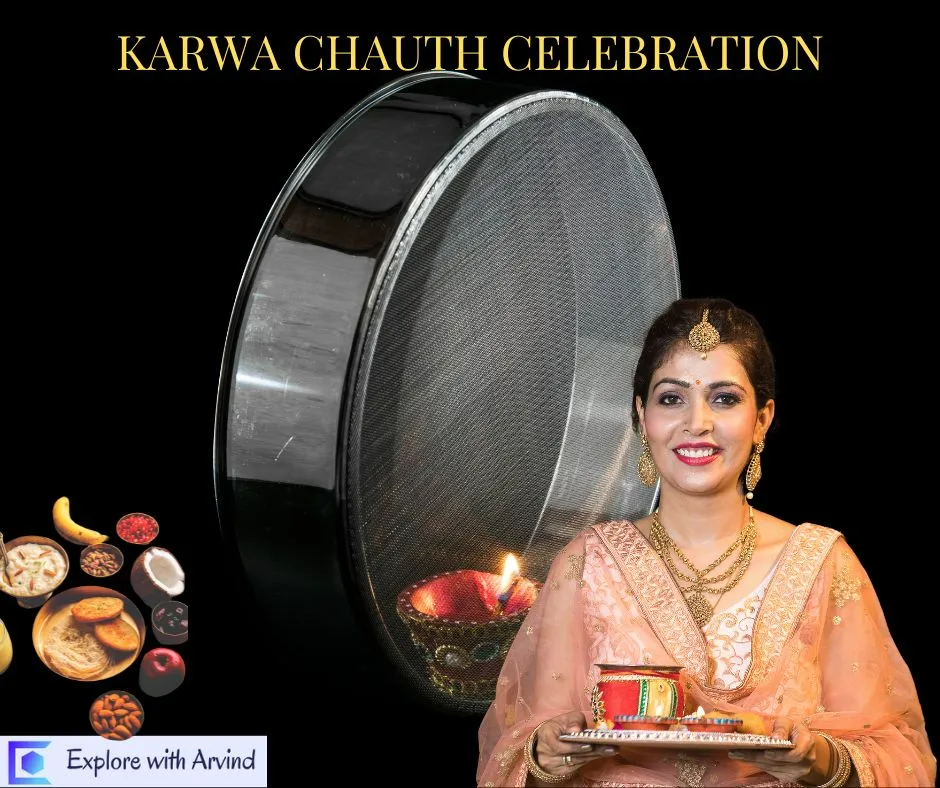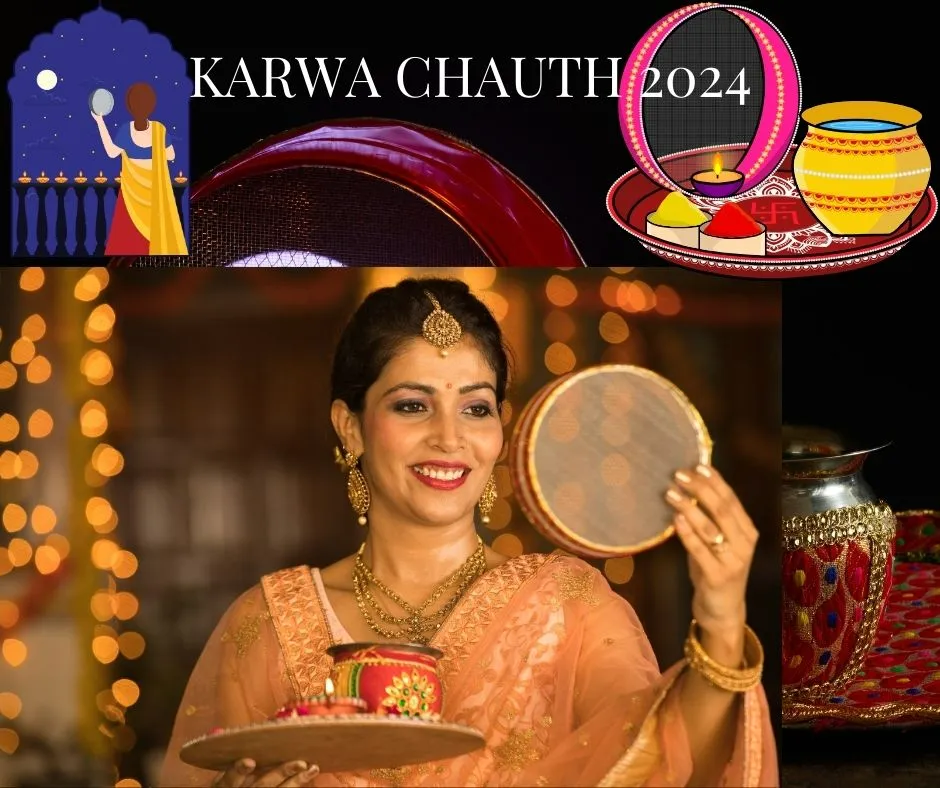Table of Contents
ToggleKarwa Chauth and It's Mythological, Social, and Economic Significance in India and Abroad
Karwa Chauth is a festival that holds immense cultural and religious importance in India, especially among married Hindu women. Celebrated on the fourth day after Purnima (full moon) in the Hindu month of Kartik, it is a day of fasting, prayer, and celebration. The festival is marked by married women fasting from sunrise to moonrise for the long life and prosperity of their husbands.
While Karwa Chauth has deep roots in Indian tradition, it has evolved in both meaning and practice, extending its influence beyond India’s borders. This article explores the mythological, social, and economic significance of Karwa Chauth in 2024, focusing on how the festival has retained its traditional values while adapting to modern contexts. Karwa Chauth 2024 will be celebrated on the 20th October 2024. Auspicious muhurt of Karwa Chauth will be from 06.46 AM, 20th October 2024 till 04.16 AM of 21st October 2024.

Mythological Significance of Karwa Chauth
The origins of Karwa Chauth are steeped in ancient Hindu mythology and folktales that highlight the festival’s deep-rooted spiritual and religious importance. A few popular legends and stories associated with Karwa Chauth are:
The Legend of Queen Veervati
One of the most popular stories associated with Karwa Chauth is the legend of Queen Veervati. According to this tale, Veervati was a beautiful queen who observed her first Karwa Chauth soon after her marriage. She fasted for the entire day without food or water, but as the day progressed, she grew weak. Her seven brothers, unable to bear her suffering, created a false reflection of the moon using a mirror in a tree and convinced her that the moon had risen. Believing her brothers, Veervati broke her fast. However, soon after, she received the news that her husband had died. Heartbroken, she prayed to Goddess Parvati, who instructed her to complete her fast with full devotion. Following the goddess’s advice, she fasted again, and her husband’s life was restored. This story underscores the belief that a devoted and faithful fast can protect and extend the life of a husband.
The Story of Karwa and Her Husband
Another significant legend is that of a devoted wife named Karwa. She was deeply in love with her husband and possessed great spiritual powers. One day, while her husband was bathing in a river, he was attacked by a crocodile. Karwa used her spiritual strength to bind the crocodile and sought Yama, the god of death, for justice. Yama, impressed by her devotion, blessed her husband with a long life and punished the crocodile. This tale symbolizes the power of a devoted wife’s prayers and the protective nature of the fast, serving as the basis for the name “Karwa Chauth.”
The Mahabharata Connection
There is also a story linking Karwa Chauth to the epic Mahabharata. It is believed that when Arjuna, one of the Pandavas, went to the Nilgiri mountains for penance, his wife Draupadi observed a similar fast. She sought Lord Krishna’s advice, who told her about the importance of observing such a fast for her husband’s well-being. Draupadi followed the ritual, and Arjuna returned safely. This narrative gives Karwa Chauth a historical and divine context, adding to its spiritual importance.
Social Significance of Karwa Chauth
Karwa Chauth is not just a religious observance; it is a celebration that strengthens marital bonds and family relationships. Its social significance can be seen through various aspects:
Strengthening Marital Bonds
At its core, Karwa Chauth is a celebration of the love and commitment between a married couple. The fast observed by the wife is a symbolic gesture of her dedication and prayers for her husband’s well-being, while the husband often reciprocates with love and gifts. This mutual expression of love reinforces their bond, making the day a special occasion for both partners. In recent years, many husbands have also started observing the fast alongside their wives, symbolizing equality and mutual respect in modern relationships.
Fostering Family Unity
The festival is also a time for families to come together. In many regions of India, women gather with friends, relatives, and neighbors to perform the rituals collectively. They sing traditional songs, share stories, and offer prayers together, creating a sense of unity and camaraderie among the women. This gathering fosters a sense of community and allows women to support each other in their devotion and fasting.
Celebration of Indian Culture and Tradition
For Indian communities living abroad, Karwa Chauth has become a way to stay connected with their roots. Despite being far from their homeland, many Indian women continue to observe the fast and perform the rituals with the same fervor, often adapting them to suit their new environment. Celebrating Karwa Chauth abroad helps preserve Indian traditions and introduces the younger generation to their cultural heritage, ensuring that these traditions endure over time.
Economic Significance of Karwa Chauth
The festival of Karwa Chauth also has a notable economic impact, especially in India, where it drives significant consumer activity and boosts local markets.
Jewelry and Apparel Markets
Karwa Chauth is a time when women traditionally dress in their best attire, often wearing bridal or brightly colored sarees, lehengas, and heavy jewelry. This results in a surge in the demand for ethnic wear, bridal attire, and traditional jewelry, particularly gold and silver. Jewelry stores, fashion boutiques, and online shopping platforms witness a spike in sales as husbands buy gifts for their wives, and women purchase new clothes and accessories for the celebration. The custom of gifting also contributes to the growth of the jewelry industry during this period.
Beauty and Wellness Industry
The preparations for Karwa Chauth include visits to beauty salons for traditional henna (mehendi) application, makeup, and other beauty treatments. As women want to look their best for the occasion, the demand for beauty services sees a significant rise in the days leading up to Karwa Chauth. The festival boosts the earnings of mehendi artists, beauticians, and small businesses involved in personal care and wellness, making it an economically significant period for this industry.
Digital Economy and E-Commerce
With the advent of digital platforms, the celebration of Karwa Chauth has become even more dynamic. E-commerce websites offer special discounts and promotions on traditional wear, jewelry, and gift items, attracting shoppers with convenient online options. Social media platforms, too, play a role in the festival, with women sharing pictures, videos, and live-streaming their rituals, further promoting traditional attire and products. This digital engagement has led to the festival’s commercialization, where brands and businesses capitalize on the emotional and cultural connection people have with Karwa Chauth.
Food and Dining Industry
While the day of Karwa Chauth is marked by fasting, it is also a time for special meals prepared before sunrise (sargi) and post-moonrise (paran) celebrations. Traditional sweets and dishes are an integral part of these meals, leading to increased business for sweet shops, caterers, and restaurants. Many restaurants offer special menus and packages for couples, creating a festive atmosphere for breaking the fast. The dining industry, thus, sees a boost during this time as families come together to enjoy traditional feasts.
Celebrating Karwa Chauth 2024: Evolving Traditions and Modern Perspectives
The celebration of Karwa Chauth in 2024 reflects both continuity and change. While the core ritual of fasting remains unchanged, many modern couples have adopted a more egalitarian approach. The idea of mutual respect and shared responsibility has gained popularity, with more husbands choosing to join their wives in fasting. This shift signifies a blend of tradition with contemporary values, appealing to the younger generation.
Additionally, the festival has expanded beyond the traditional regions of North India, finding resonance among communities in other parts of India and the Indian diaspora abroad. Social media and online communities have played a significant role in spreading awareness about Karwa Chauth, making it easier for those living away from India to participate in the celebrations. Online puja (worship) kits, virtual mehendi services, and video calls with family have become common ways for women to stay connected to their roots while living in different time zones.

Conclusion: The Timeless Appeal of Karwa Chauth
Karwa Chauth is more than just a day of fasting; it is a celebration of love, devotion, and cultural heritage. Its mythological stories highlight the power of a wife’s prayers, while its social aspects foster togetherness and reinforce marital bonds. Economically, Karwa Chauth has become an important time for various industries, from fashion and jewelry to digital commerce and dining.
As Karwa Chauth 2024 approaches, it is clear that the festival’s appeal remains strong, both in India and abroad. It is a reminder of the enduring nature of cultural traditions, even in a rapidly changing world. The essence of Karwa Chauth lies in the values of love, faith, and togetherness, making it a celebration that continues to resonate with people across generations and geographies. Through its evolving practices, Karwa Chauth bridges the gap between ancient customs and modern life, ensuring that its significance is both timeless and universal.